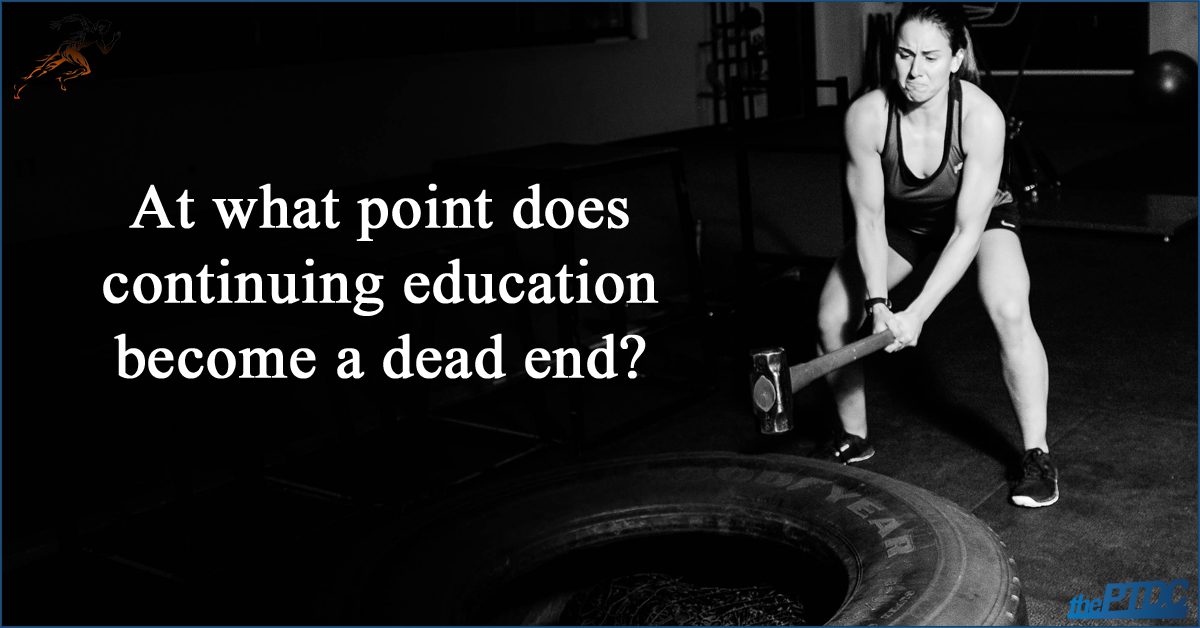The personal training and sports performance field is constantly changing. We have an abundance of new evidence, certifications, and weekend workshops literally at our fingertips.
I remember mail ordering checks for the best books on personal training, Xeroxing handouts from clinics our coaches went to, and then the "new age" wave of DVD's and VHS tapes. Old school? Talk about dinosaur training!
Nowadays, personal trainers and coaches are taught that learning through continuing education is what helps us stand above the crowd. Which is why many show off their certifications like a badge of honor.
However, the coaches and trainers that do the best are ones that usually are masters of the fundamentals. It may seem boring, but excelling at the following will greatly benefit your career.

Coaching Eye
The "Coaching Eye" is the ability to assess and correct an issue with ease. Simply put, these are the coaches that can quickly assess errors in a matter of seconds. This is developed through the guidance of another experienced coach, and practical experience.
Listening
This skill isn't just about listening to what your client says, but also to what they need based on their body language and overall attitude (how they're speaking to you). This feedback comes from asking the right questions, in the right way, and by monitoring their non-verbal cues.
Coaching
Trainers and coaches need to able to coach. This means teaching a client how to do X lift without overwhelming them and making a difficult task seem very simple. This is developed through years of practical experience and being mentored by a qualified coach.
Continuing Ed a Dead End?
My point isn't to dismiss continuing education courses, but to ask trainers to value the fundamentals. Once you've accomplished this, then keep progressing into higher-level skill sets that are unique or add value. It's akin to focusing on the window trimming without having the foundations of your house developed yet.
With that said, before you spend money on any continuing education course, you should ask yourself these questions:
Does it directly add value to your demographic?
If you work with general population clients that want to get fit, would a clinic on a 100m-sprint analysis be useful? Why would you spend X amount of money on this if it's not benefiting your clients? Yes, it's fun and cool, but the time spent could've been spent at another course/seminar that would be useful for your specific clientele.
If you're a personal trainer that works with weight-loss clients, head to a seminar on dieting or the psychology of developing habits. You may know a ton but I'm sure that you can pick up a few more tricks to add to your tool belt.
What To Spend On?
1. Weaknesses - One at a time
Most of us know what our own weakness is. Whether it's assessments, relatable cues for personal trainers, fitness programming, etc... Choose one and hammer it until you're well versed. Then you can move onto a new skill set that will help you become a better trainer.
Trying to master multiple skill sets will only water down your efforts. Focus, master it, and then move to the next.
2. Practical and Profitable
An advanced anatomy class may interest you and potentially make you a more complete trainer. However, taking a hands-on fitness assessment course could help you immediately. And happy client = referrals = win-win.
With that said, be careful about advancing yourself too far into XYZ certification, clinics, mentorships, etc. Your time and money is precious, so ask yourself:
"Would a level 2,3,4 of X certification really benefit your clients?"
If yes, then go for it. But more than likely it wont, unless you're in a special niche. Still, if you enjoy learning those skills then go for it.
3. Business
Becoming a better trainer isn't always about fitness education but also the business side of things. Skills like learning to how to sell personal training, how you speak to your clients, managing your trainers and your own time, etc.
Seemingly small things matter, like how you want your clients to describe your company or services.
Would you want your client to say?
"Hey Joe is a great personal trainer you should workout with him."
This sounds harmless, however, it's vague, and to some clients may bring up fearful images of "The Biggest Loser" style training. If your training doesn't match this, then you just lost yourself a client.
Learn marketing, branding, sales, and even mentorship programs. You may have all the knowledge and training skill sets to be successful but if you can't get your client to buy into your program or brand yourself correctly then no one will get to know how great you are.
This has been the most difficult for me since my transition into the private sector. I always wondered why these whacky trainers that have their clients jumping on stability balls into cartwheels were so successful. It all came down to selling themselves.
To Long Term Success
The point isn't that continuing education is worthless, but rather to not get sucked into developing every skill set and widening your specialties.
Focus on the fundamentals and to spend your hard earned money and time on skill sets that will be useful for your demographic, not what the current popular fad is.










